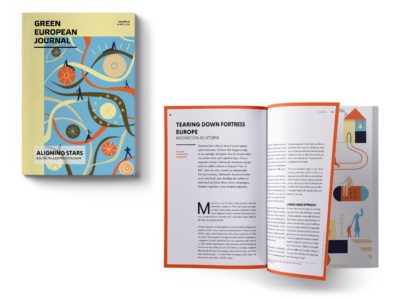Cultural and political belonging in Moldova is complex and affects how the EU is viewed. Could placing the idea of Europe at the heart of the country’s development agenda create a positive consensus going forward?
Shaped by the country’s common heritage with Romania, its Russian imperial and Soviet past, and the internationalisation of its youth, the culture of Moldova – a former Soviet republic bordered by Romania and Ukraine – is marked by diverse, intersecting sociocultural milieus or “cultural bubbles”.
The biggest bubble cherishes Moldova’s deeply local traditions: winemaking, delicious food, folk music, and celebrations such as weddings.
A second cultural bubble is rooted in Moldova’s Romanian-language cultural heritage, literature, and music. Romanian culture experienced a revival in Moldova in the late 1980s and 1990s during the national renaissance that grew up in protest against Soviet Russification. In recent years it has been modernised and revitalised via migration as well as increased exchanges between the Romanian and Moldovan music, literature, film, and theatre scenes.
A further cultural bubble – distinguished by the use of the Russian language – was inherited from the Soviet era. Successfully perpetuated by the Russian media following Moldovan independence in 1991, this cultural bubble only began to shrink in the wake of Russia’s full-scale invasion of Ukraine in 2022.
Finally, the newest bubble, which is proving particularly attractive to educated young people, has strong links to anglophone culture. This is spread via films, music, and social media, and is a fruit of time spent working or studying abroad.
Some level of connection to local traditions is shared by all Moldovans and cannot be associated with political affiliation. But Moldovans’ relative degree of comfort with the Romanian, Russian, and anglophone cultural bubbles appears to be strongly linked to geopolitical views and voting preferences.
Interestingly, feelings of cultural belonging are not always rooted in one’s native tongue but also in second languages. While Romanian speakers tend to be stronger supporters of the EU than Russian speakers, certain speakers of Romanian feel most at home within Russian culture and are more closely aligned with Moscow. Similarly, there is a sizeable group of Russian speakers who feel comfortable with English and/or Romanian and are staunchly pro-European.
Voter behaviour can also be surprising. In 2015, the central Moldovan town of Orhei, 40 kilometres north of the capital Chişinău, voted in pro-Russian oligarch Ilan Shor as its mayor. Shor, who is currently living in hiding in Israel following convictions for fraud and money laundering, promised to transform the town into “Monaco”, as well as repair all roads and provide free public transport and Wi-Fi at his own cost. His hand-picked successor, Shor party member Pavel Verejeanu, won the 2019 mayoral election with 80 per cent of the vote. Curiously, however, the same Orhei residents cast their votes for the pro-European current incumbent Maia Sandu in the 2020 presidential election.
The idea of Europe is increasingly gaining ground in Moldova, primarily as a dream and promise of modern development. In the Chişinău mayoral election in November 2023, PAS candidate Lilian Carp and Platforma DA’s Victor Chironda both used the slogan “For A European City” for a period of time. The candidate eventually elected was incumbent Ion Ceban, who won his 2019-2023 mandate as a member of pro-Russian party PSRM. Having subsequently vouched to become a technocrat and leave geopolitics behind, Ceban has since changed tack, founding the National Alternative Movement (MAN), which he claims to be a pro-European social democratic party. While some analysts saw this as a pragmatic step aligned with Moldova’s general turn towards Europe, in October 2022 the US Department of the Treasury stated that political consultants close to the Kremlin helped Ceban set up his new venture. A recent investigation by Russian Dossier Center and the Estonian newspaper Eesti Paevaleht also revealed that Ceban was on a secret visit to Moscow and St Petersburg days the Russian invasion of Ukraine. These allegations, which were subsequently refuted by Ceban, suggest that he may be a Trojan horse designed to block Moldova’s path to EU integration. To date, the Moldovan authorities have failed to open any public investigation into the matter.
In addition to the dream of making Chişinău a “European city”, Moldova has also introduced “The European Village”, a local development programme focused on sustainability, the provision of quality public services, and access to social infrastructure. For inhabitants of the Moldovan capital, this could mean the creation of cycle lanes, better maintained parks, improved public transport, and a halt to illegal construction projects. A possible solution to rural depopulation, “European villages” aim to offer peaceful rural locations combined with modern sewerage and sanitation infrastructure, well-maintained kindergartens and schools, and green energy. Beyond Moldova’s national aspirations for a reformed, fair judiciary and less corruption, this is what Europe means to its citizens.

